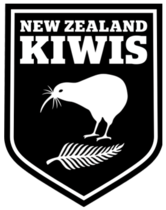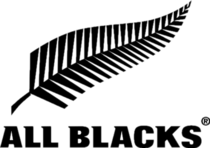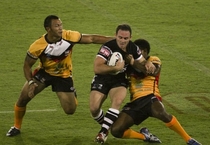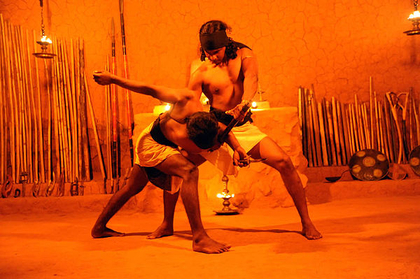
South Africa national rugby union team
The South Africa national rugby union team, commonly known as the Springboks (colloquially the Boks, Bokke or Amabokoboko), is the country's national team governed by the South African Rugby Union. The Springboks play in green and gold jerseys with white shorts. Their emblem is a native antelope, the Springbok, which is the national animal of South Africa. The team has been representing South Africa in international rugby union since 30 July 1891, when they played their first test match against a British Isles touring team. They are currently the reigning World Champions and have won the World Cup on 3 occasions, (1995, 2007, and 2019). The Springboks are equalled with the All Blacks with 3 World Cup wins. The team made its World Cup debut in 1995, when the newly democratic South Africa hosted the tournament. Although South Africa was instrumental in the creation of the Rugby World Cup competition, the Springboks did not compete in the first two World Cups in 1987 and 1991 because of international anti-apartheid sporting boycotts. The Springboks defeated the All Blacks 15–12 in the 1995 final, which is now remembered as one of the greatest moments in South Africa's sporting history, and a watershed moment in the post-Apartheid nation-building process. South Africa regained the title as champions 12 years later, when they defeated England 15–6 in the 2007 final. As a result of the 2007 World Cup tournament the Springboks were promoted to first place in the IRB World Rankings, a position they held until July the following year when New Zealand regained the top spot. They were named 2008 World Team of the Year at the Laureus World Sports Awards. South Africa then won a third World Cup title, defeating England 32–12 in the 2019 final. As a result of this, the South African National Rugby Union Team were named 2020 World Team of the Year at the Laureus World Sports Awards for a second time. The Springboks also compete in the annual Rugby Championship (formerly the Tri-Nations), along with their Southern Hemisphere counterparts Argentina, Australia and New Zealand. They have won the Championship on four occasions in Twenty-Four competitions and are the only team to have won a version of the competition and the Rugby World Cup in the same year. For almost a hundred years, South Africans have been proud of the performance of their rugby union team, the Springboks are known throughout the world, even by non-rugby specialists. Rugby union is very popular in South Africa, the one which is practiced preferably by the most talented sportsmen of the country. Many teams have had their biggest defeats to the Springboks; including Australia, Italy, Scotland, Uruguay and Wales.
Смотреть все
0
0

New Zealand national rugby league team
The New Zealand national rugby league team (Māori: Tīma rīki motu Aotearoa) has represented New Zealand in rugby league since 1907. Administered by the New Zealand Rugby League, they are commonly known as the Kiwis, after the native bird of that name. The team's colours are black and white, with the dominant colour being black, and the players perform a haka before every match they play as a challenge to their opponents. The New Zealand Kiwis are currently second in the IRL World Rankings. Since the 1980s, most New Zealand representatives have been based overseas, in the professional National Rugby League and Super League competitions. Before that, players were selected entirely from clubs in domestic New Zealand leagues. A New Zealand side first played in a 1907 professional rugby tour which pre-dated the birth of rugby league football in the Southern Hemisphere, making it the second oldest national side after England. Since then the Kiwis have regularly competed in international competition, touring Europe and Australia throughout the 20th century. New Zealand have competed in every Rugby League World Cup since the first in 1954, reaching three consecutive tournament finals between 2000–2013. In 2008, New Zealand won the World Cup for the first time. They also contest the Baskerville Shield against England.
Смотреть все
0
0

New Zealand Rugby
New Zealand Rugby (NZR) is the governing body of rugby union in New Zealand. It was founded in 1892 as the New Zealand Rugby Football Union (NZRFU), 12 years after the first provincial unions in New Zealand. In 1949 it became an affiliate to the International Rugby Football Board, now known as World Rugby, the governing body of rugby union for the world. It dropped the word "Football" from its name in 2006. The brand name New Zealand Rugby was adopted in 2013. Officially, it is an incorporated society with the name New Zealand Rugby Union Incorporated. The organisation's main objectives, as displayed in the NZR Constitution, are to promote and develop rugby throughout New Zealand; arrange and participate in matches and tours in New Zealand and overseas; represent New Zealand in World Rugby; form and manage New Zealand representative teams; and encourage participation in the sport. NZR Headquarters are located in Wellington, New Zealand, with an office in Auckland.
Смотреть все
0
0

New Zealand national rugby union team
The New Zealand national rugby union team, commonly known as the All Blacks (Ōpango), represents New Zealand in men's international rugby union, which is considered the country's national sport. Famed for their unmatched international success, the All Blacks have often been regarded as the most successful sports team in human history. The team won the Rugby World Cup in 1987, 2011 and 2015. They were the first country to win the Rugby World Cup 3 times and the first country to retain the Rugby World Cup. New Zealand has a 76 per-cent winning record in test-match rugby, and has secured more wins than losses against every test opponent. Since their international debut in 1903, New Zealand teams have played test matches against 19 nations, of which 12 have never won a game against the All Blacks. The team has also played against three multinational all-star teams, losing only eight of 45 matches. Since the introduction of the World Rugby Rankings in 2003, New Zealand has held the number-one ranking longer than all other teams combined. They jointly hold the record for the most consecutive test match wins for a tier-one ranked nation, along with England. The All Blacks compete with Argentina, Australia and South Africa in the Rugby Championship, and have won the trophy nineteen times in the competition's 27-year history. The team has completed a Grand Slam tour against the four Home Nations four times (1978, 2005, 2008 and 2010). World Rugby has named New Zealand the World Rugby Team of the Year ten times since the award was initiated in 2001, and an All Black has won the World Rugby Player of the Year award ten times over the same period. Fifteen former All Blacks have been inducted into the International Rugby Hall of Fame. The team's first match took place in 1884 in New South Wales and their first international test match in 1903 against Australia in Sydney. The following year New Zealand hosted their first home test, a match against a British Isles side in Wellington. There followed a 34-game tour of Europe and North America in 1905 (which included five test matches), where New Zealand suffered only one defeat: their first test loss, against Wales. New Zealand's early uniforms consisted of a black jersey with a silver fern and white shorts. By the 1905 tour they were wearing all black, except for the silver fern, and the name "All Blacks" dates from this time. The team perform a haka before every match; this is a Māori challenge or posture dance. Traditionally the All Blacks use Te Rauparaha's haka Ka Mate, although players have also performed Kapa o Pango since 2005.
Смотреть все
0
0

Rugby league
Rugby league football, commonly known as just rugby league and sometimes football, footy, rugby or league, is a full-contact sport played by two teams of thirteen players on a rectangular field measuring 68 metres (75 yards) wide and 112–122 metres (122 to 133 yards) long with H shaped posts at both ends. It is one of the two codes of rugby football, the other being rugby union. It originated in 1895 in Huddersfield, Yorkshire as the result of a split from the Rugby Football Union over the issue of payments to players. The rules of the game governed by the new Northern Rugby Football Union progressively changed from those of the RFU with the specific aim of producing a faster and more entertaining game to appeal to spectators, on whose income the new organisation and its members depended. Due to its high-velocity contact, cardio-based endurance and minimal use of body protection, rugby league is widely regarded as the toughest and most brutal collision sport in the world. In rugby league, points are scored by carrying an oval shape ball and touching it to the ground beyond the opposing team's goal line; this is called a try, and is the primary method of scoring, worth 4 points. The opposing team attempts to stop the attacking side scoring points by tackling the player carrying the ball and denying forward progress. On occasion, where a clear try scoring opportunity has been thwarted by foul play, a penalty try may be awarded without the ball being grounded over the try line. In addition to tries, points can be scored by kicking goals. Field goals or drop goals can be attempted from the hand at any time for a single point, and following a successful try, the scoring team gains a free kick to try at goal with a conversion worth a further two points. Penalty kicks at goal, known simply as penalties may also be awarded for general foul play, and are also worth two points. Unlike drop goals, penalty kicks and conversions are taken from the ground, with the ball usually set in a kicking tee, and the opposing team not allowed to directly challenge the kicker. The Super League in Europe and the National Rugby League (NRL) in Australasia are the world's premier club competitions. Globally, rugby league is played internationally, predominantly by European, Australasian, and Pacific Island countries, and is governed by the International Rugby League (IRL). Rugby league is the national sport of Papua New Guinea, and is a popular sport in countries such as England, Australia, New Zealand, France, Tonga, Fiji, Samoa, and Lebanon. The first Rugby League World Cup was held in France in 1954, the first World Cup of either Rugby code; the current holders are Australia. A short-sided version of the sport, Rugby league nines, using modified rugby league rules also exists, and is comparable to Rugby sevens. Wheelchair rugby league is a mixed-gender sport using heavily modified rugby league rules for disabled and able-bodied players. Unlike Wheelchair rugby which adopted its name after the invention of the sport previously called Murderball and is not directly linked to rugby union, wheelchair rugby league has grown out of the parent sport, and retains key aspects of that sport such as an egg shaped ball, the forward-pass rule and conversions. while not a Paralympic sport, the sport has its own Wheelchair Rugby League World Cup. A further variation for ambulatory disabled players, Physical disability rugby league or PDRL was created and had its first world cup in 2022 to coincide with the rescheduled 2021 Rugby League World Cup competitions.
Смотреть все
0
0
Rugby World Cup
The Rugby World Cup is a men's rugby union tournament contested every four years between the top international teams. The tournament is administered by World Rugby, the sport's international governing body. The winners are awarded the Webb Ellis Cup, named after William Webb Ellis, who according to a popular legend, invented rugby by picking up the ball during a football game. The tournament was first held in 1987 and was co-hosted by New Zealand and Australia. Four countries have won the trophy; New Zealand and South Africa three times, Australia twice, and England once. South Africa is the current champion, having defeated England in the 2019 tournament final. Sixteen teams participated in the tournament from 1987 until 1995; since 1999, twenty teams have participated in each tournament. Japan hosted the 2019 Rugby World Cup and France will host the next in 2023. Beginning 2021, the women's equivalent tournament was officially renamed Rugby World Cup to promote equality with the men's game.
Смотреть все
0
0
Ice Hockey World Championships
The Ice Hockey World Championships are an annual international men's ice hockey tournament organized by the International Ice Hockey Federation (IIHF). First officially held at the 1920 Summer Olympics, it is the sport's highest profile annual international tournament. The IIHF was created in 1908 while the European Championships, the precursor to the World Championships, were first held in 1910. The tournament held at the 1920 Summer Olympics is recognized as the first Ice Hockey World Championship. From 1920 to 1968, the Olympic hockey tournament was also considered the World Championship for that year. The first World Championship that was held as an individual event was in 1930 in which twelve nations participated. In 1931, ten teams played a series of round-robin format qualifying rounds to determine which nations participated in the medal round. Medals were awarded based on the final standings of the teams in the medal round. In 1951, thirteen nations took part and were split into two groups. The top seven teams (Pool A) played for the World Championship. The other six (Pool B) played for ranking purposes. This basic format would be used until 1992 (although small variations were made). During a congress in 1990, the IIHF introduced a playoff system. As the IIHF grew, more teams began to participate at the World Championships, so more pools (later renamed divisions) were introduced. The modern format for the World Championship features 16 teams in the championship group, 12 teams in Division I, 12 teams in Division II and 12 teams in Division III. If there are more than 52 teams, the rest compete in Division IV. The teams in the championship play a preliminary round, then the top eight teams play in the playoff medal round and the winning team is crowned World Champion. Over the years, the tournament has gone through several rule changes. In 1969 body-checking in all three zones in a rink was allowed, helmets and goaltender masks became mandatory in the early 1970s and in 1992 the IIHF began using the shootout. The current IIHF rules differ slightly from the rules used in the NHL. From the 1920 Olympics until the 1976 World Championships, only athletes designated as "amateur" were allowed to compete in the tournament. Because of this, players from the National Hockey League and its senior minor-league teams were not allowed to compete, while the Soviet Union was allowed to use permanent full-time players who were positioned as regular workers of an aircraft industry or tractor industry employer that sponsored what would be presented as an after-hours amateur social sports society team for their workers. In 1970, after an agreement to allow just a small number of its professionals to participate was rescinded by the IIHF, Canada withdrew from the tournament. Starting in 1977, professional athletes were allowed to compete in the tournament and Canada re-entered. The IIHF requires that players are citizens of the country they represent and allow players to switch national teams provided that they play in their new nation for a certain period of time. Canada was the tournament's first dominant team, winning the tournament 12 times from 1930 to 1952. The United States, Czechoslovakia, Sweden, Great Britain and Switzerland were also competitive during this period. The Soviet Union first participated in 1954 and soon became rivals with Canada. From 1963 until the nation's breakup in 1991, the Soviet Union was the dominant team, winning 20 championships out of 26. During that period, only three other nations won medals: Canada, Czechoslovakia and Sweden. Russia first participated in 1992 and the Czech Republic and Slovakia began competing in 1993. In the 2000s, the competition became more open as the "Big Six" teams–Canada, the Czech Republic, Finland, Russia, Sweden, and the United States–have become more evenly matched. As this tournament takes place during the same period as the later stages of the NHL's Stanley Cup playoffs, many of that league's top players are not available to participate for their national teams or have only become available after their NHL teams have been eliminated, after playing 90+ games. North American teams, and especially the United States, have been criticized for not taking this tournament seriously. For example, USA Hockey often sent teams made up of younger NHL players alongside college players, not using top level stars even when they are available. The 2015 World Championship, held in Prague and Ostrava, Czech Republic, was the most successful to date in terms of overall attendance; it was visited by 741,690 people and average attendance was at 11,589.
Смотреть все
0
0

Ice hockey
Ice hockey is a contact team sport played on ice, usually in a rink, in which two teams of skaters use their sticks to shoot a vulcanized rubber puck into their opponent's net to score goals. The sport is known to be fast-paced and physical, with teams usually fielding six players at a time: one goaltender, and five players who skate the span of the ice trying to control the puck and score goals against the opposing team. Ice hockey is most popular in Canada, central and eastern Europe, the Nordic countries, Russia, and the United States. Ice hockey is the official national winter sport of Canada. In addition, ice hockey is the most popular winter sport in Belarus, Croatia, the Czech Republic, Finland, Latvia, Russia, Slovakia, Sweden, and Switzerland. North America's National Hockey League (NHL) is the highest level for men's ice hockey and the strongest professional ice hockey league in the world. The Kontinental Hockey League (KHL) is the highest league in Russia and much of Eastern Europe. The International Ice Hockey Federation (IIHF) is the formal governing body for international ice hockey, with the IIHF managing international tournaments and maintaining the IIHF World Ranking. Worldwide, there are ice hockey federations in 76 countries. In Canada, the United States, Nordic countries, and some other European countries the sport is known simply as hockey; the name "ice hockey" is used in places where "hockey" more often refers to field hockey, such as countries in South America, Asia, Africa, Australasia, and some European countries including the United Kingdom, Ireland and the Netherlands. Ice hockey is believed to have evolved from simple stick and ball games played in the 18th and 19th centuries in the United Kingdom and elsewhere. These games were brought to North America and several similar winter games using informal rules were developed, such as shinny and ice polo. The contemporary sport of ice hockey was developed in Canada, most notably in Montreal, where the first indoor hockey game was played on March 3, 1875. Some characteristics of that game, such as the length of the ice rink and the use of a puck, have been retained to this day. Amateur ice hockey leagues began in the 1880s, and professional ice hockey originated around 1900. The Stanley Cup, emblematic of ice hockey club supremacy, was first awarded in 1893 to recognize the Canadian amateur champion and later became the championship trophy of the NHL. In the early 1900s, the Canadian rules were adopted by the Ligue Internationale de Hockey Sur Glace, the precursor of the IIHF and the sport was played for the first time at the Olympics during the 1920 Summer Olympics. In international competitions, the national teams of six countries (the Big Six) predominate: Canada, Czech Republic, Finland, Russia, Sweden and the United States. Of the 69 medals awarded all-time in men's competition at the Olympics, only seven medals were not awarded to one of those countries (or two of their precursors, the Soviet Union for Russia, and Czechoslovakia for the Czech Republic). In the annual Ice Hockey World Championships, 177 of 201 medals have been awarded to the six nations. Teams outside the Big Six have won only five medals in either competition since 1953. The World Cup of Hockey is organized by the National Hockey League and the National Hockey League Players' Association (NHLPA), unlike the annual World Championships and quadrennial Olympic tournament, both run by the International Ice Hockey Federation. World Cup games are played under NHL rules and not those of the IIHF, and the tournament occurs prior to the NHL pre-season, allowing for all NHL players to be available, unlike the World Championships, which overlaps with the NHL's Stanley Cup playoffs. Furthermore, all 12 Women's Olympic and 36 IIHF World Women's Championship medals were awarded to one of these six countries. The Canadian national team or the United States national team have between them won every gold medal of either series.
Смотреть все
0
0







Комментарии